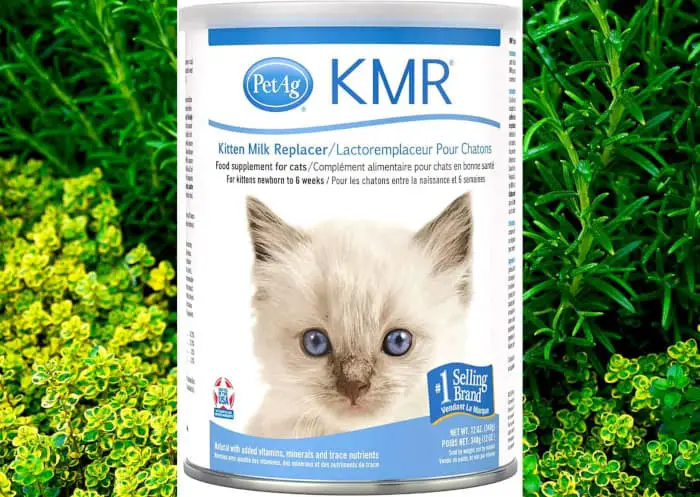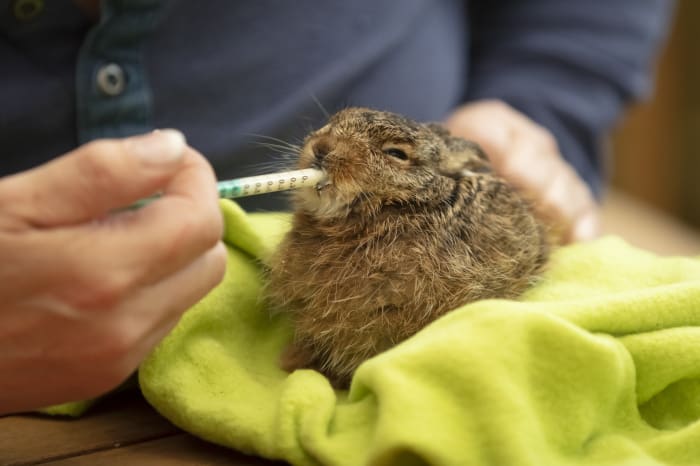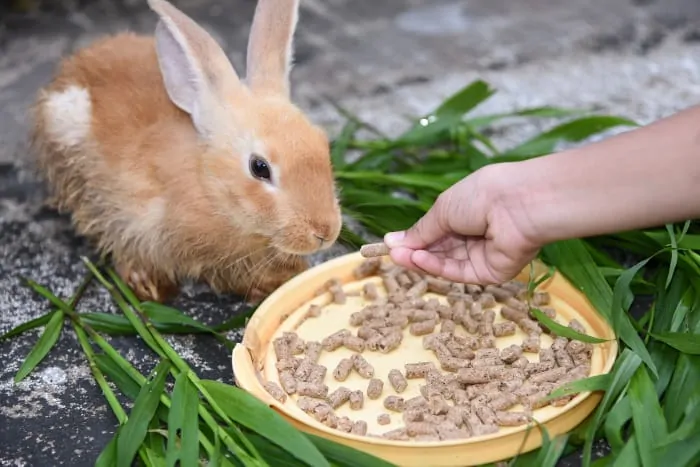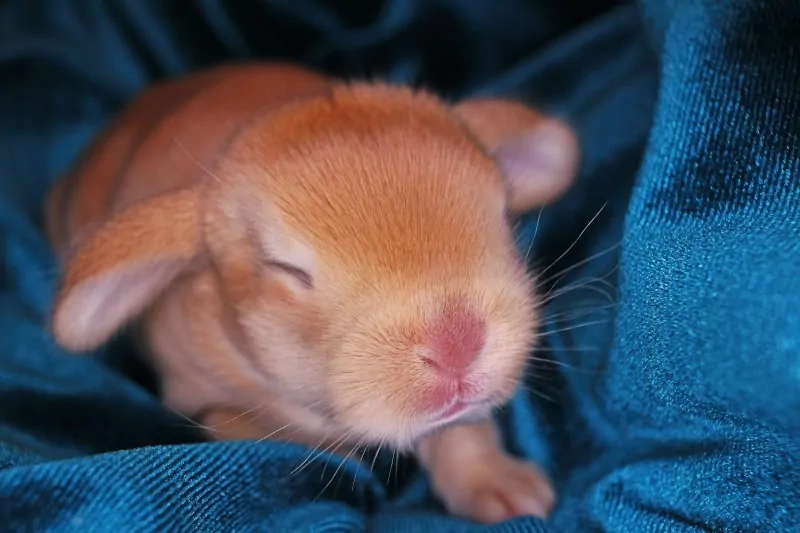If you are raising baby rabbits, it can be a very exciting time. Pet owners with baby rabbits may be a bit anxious about their newborns. As a new breeder, you may want to do all that is within your power to ensure all your kits survive. Of course, a major factor in the good health of your baby rabbits is their diet. What your kits consume affects their growth rate, their weight, and their ability to weather any external factors that might affect them. Here we will explore what you should feed baby rabbits and any additional dietary advice that you may need to ensure their health.
Under what circumstances would a pet owner have to feed a baby rabbit?
A baby rabbit is normally nursed by his mother. However, there are times when this normal feeding process does not occur. As a responsible pet owner you may have to step in if the following conditions occur:
- First pregnancy – Sometimes, a doe may show no interest in feeding or taking care of the kits in her litter. She is new to motherhood and may not fully grasp her roll. This may happen when the female rabbit is allowed to mate very early in her life. If this occurs you may have to intervene to provide the nutrition that the newborns need. However, you should be sure that the mother is neglecting her baby rabbits before you intervene. Does do not constantly tend to their kits. It may seem that a mother is ignoring her babies, but in fact, she may be feeding them when you are not around to observe the process. You can examine the baby rabbits to determine whether they are being fed. If their little bellies appear rounded and full, their skin is pink and not particularly wrinkled, they are being fed by their mothers. Peaceful sleeping patterns are also a sign that they are being fed. If you observe these indicators, you should not intervene and just let nature take its course.
- Injury/illness – If the mother is injured or falls ill after the birth she may be unable to feed her kits. If she is ill, her milk production may not be enough to sustain all of her baby kits.
- Orphaned or abandoned rabbits – In this circumstance, if the mother is dead or simply has left her litter unattended, you have no choice but to intervene.
What should baby rabbits be fed?
If feeding duties fall to you, there are basically two options that you can consider, Kitten Milk Replacer or goat milk.
- Kitten Milk Replacer – In order for your kits to get the maximum benefit from the formula, you should mix in with heavy whipping cream with no sugar to increase its calorie content. You can purchase Kitten Milk Replacer at your local pet store or your veterinarian may stock it as well.

- Goat Milk – This is also an excellent substitute for the milk that the rabbit produces. You can buy it at a pet store or if you live in a rural area, you may be able to purchase straight from a farm. Most likely you will get a better price if you buy it directly from a goat farmer.
- Acidophilus – In order to ensure gut health and proper digestion, you can mix acidophilus with the Kitten Milk replacer or goat milk. They usually come in capsule form. You can simply open the capsule and mix it thoroughly with your choice of formula.
Is there a special way to feed a baby rabbit?
There are some rules that you should follow when feeding a baby rabbit safely and effectively.
- Use a syringe – you shouldn’t use a bottle with a nipple to feed baby rabbits. A syringe is the preferred receptacle. The kits will nurse from the syringe. You should never push the top of the syringe to force the formula into the mouths of the baby rabbits. This could be a choking hazard.
- 2 feedings per day – I would recommend that you feed baby rabbits twice per day, usually in the morning, and then again in the evening. The suggested feeding amounts below should be divided between the two feedings.
- Newborns – 1-week old kits – 4-5 cc of formula
- 1-2 week old kits – 10-15 cc of formula
- 2-3 week old kits– 15-30 cc of formula
- 3-6 week old kits until they are weaned– 30 cc of formula
- Feed baby rabbits on their back – The most comfortable position for a baby rabbit to feed would be on its back. This is how he feeds naturally from his mother. However, if the kit seems unwilling to stay in this position, just follow the baby rabbit’s lead.
- Stimulate urination and bowel movements – This activity is just as crucial as the actual feeding itself. Kits must defecate and urinate before or after each feeding. While this may happen normally, when your pet rabbit is feeding her babies her milk, the process may not be as smooth with formula. This is where you need to intervene. You need to stimulate them to ensure that their urinary and intestinal systems function properly. The procedure is simple, you simply wet a cotton ball and gently stroke the baby rabbit’s anal and genital area. Eventually, the kit will urinate and have a bowel movement. You should continue gently stroking the baby rabbit until you are sure he is finished. This action imitates the action that the mother would do with her tongue to have the same effect. You will only need to do this for approximately 10 days or alternatively until the baby kits eyes open. You should also pay attention to the stool of your kits. It is should be green or yellow or any shade of the two colors. If it is brown and grainy, this is cause for concern. This means that your baby rabbit is dehydrated and you should take your baby rabbit to the veterinarian as soon as possible. This constitutes an emergency.

Why is your baby rabbits diet important?
When you are substituting mother’s milk, you want to be sure that your baby rabbit is getting the nutrition that she requires. A good diet is important for two main reasons:
- Optimal growth – A good diet is essential for your baby rabbit’s proper development. It is important that rabbits grow at an acceptable rate so that they can reach the full potential of their breed.
- Digestive system development – Rabbits have very sensitive digestive systems and what they are fed in their early life, affects this system functioning normally into adulthood.
How soon can I give my baby rabbit water?
Your baby rabbit may start drinking water in addition to the formula, at about 3 to 4 weeks of age without suffering any ill effects on his digestive system.
When can my baby rabbit start eating solid food?
Your baby rabbits will take their first bites of solid food somewhere between 2 or 3 weeks. It will most likely be hay from their nests. Even though you may notice these furtive bites, you should still continue feeding them their formula or goat milk. A mother rabbit nurses her baby rabbits until 6 to 8 weeks.
What should I feed my baby rabbit during the weaning process?
Weaning is a very delicate process and solids should be introduced gradually. Make sure to always manage weaning carefully. Dietary changes are one of the major causes of gastric distress in pet rabbits. Here is an idea of what your baby rabbits’ first foods should be.
- Hay – It is no surprise that hay, would be one of the first solid foods that a baby rabbit may eat. Hay makes up 80% of a pet rabbit’s diet and provides the much needed dietary fiber that a bunny requires.
- Pellets – Some pet owners introduce pellets at this stage. The pellets introduced at this stage should be plain and high in fiber. You should not give your baby rabbit any flavored pellets at this stage. You should place pellets in a box in the nest and make sure they are always fresh.
- Water – Make sure it’s always fresh. You should wash water bowls and refill them periodically during the day. You should put water in a shallow container in the cage or hutch. This is a safety tip to prevent your kits from accidentally drowning.

Do not introduce fruits and vegetables at this stage, there will be time for that later on. Your baby rabbits may still beg for formula pass 8 weeks. In order to make the transition a little smoother, you can start diluting the formula with clean water. At first, you should use a 25 % water and 75% formula ratio and slowly reduce the amount of formula until eventually, the baby rabbits will simply lose interest.
Feeding baby rabbits is an important job and literally means the difference between life and death. Where rabbit mothers are absent or deceased, you must rise to the occasion and feed kits formula that closely resembles the mother’s milk. By your baby rabbit’s 8th week of life, he will be well on his way to graduating to adult food. This is a sign that you have gotten your baby rabbit through this crucial phase and congratulations are in order.

